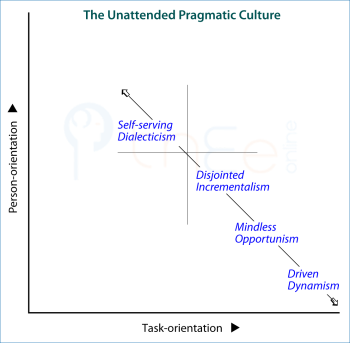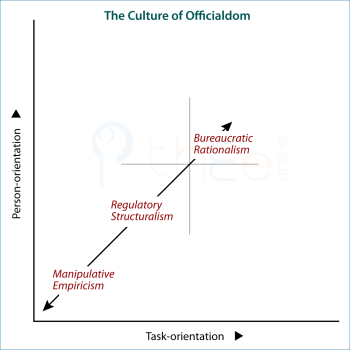Cultures of Neglect
«Start where you are!» is an easy if awkward rule of life. The starting point for incoming new management is often an unattended culture, either chaotic or listless; or a frustrating bureaucratic culture.
The Unattended Culture

The minimum requirement for survival of any business is coping with crises. So pragmatic incoherent responsiveness is the culture of any unattended organization.
In business, when the pressure for results is off, the organization becomes more sensitive to people and it moves up the Y-axis i.e. it operates in a fashion and becomes self-serving.
As the pressure for results increases, management becomes initially , and then more as it moves out along the X-axis.![]() More ►
More ►
In public sector agencies, pragmatic cultures are the norm, but here they can usually avoid being too pressured because their income and existence are permanently secured. These organizations also commonly stagnate in a version of . ![]() Agencies may, however ►
Agencies may, however ►
The Culture of Officialdom

Government officials often act on behalf of politicians as "headquarters" for large agencies like the prison service, social security or health service. They are unable to take direct action themselves, but are still expected to handle issues. (Something similar may apply to HQs of holding companies and multi-nationals.)
Ministers of State, hounded by failures and incompetence (inevitable with political initiatives in pragmatic cultures) demand that their officials somehow force subsidiary agencies to improve performance and avoid cock-ups.
The result is…
This effort to assert accountability and control leads to:
● flows of detailed specifications and regulations for: committees, posts, pay scales, staffing levels, operating methods, budget decisions, personnel procedures, complaints, report protocols &c;
● proliferation of binding rules and stringent procedures for every possible contingency from pest infestation to Christmas party arrangements—such rules are only added, and rarely removed.
The inflexibility and inappropriateness of reactive regulatory arrangements devised far away and long ago worsens the situation and increases political pressure. In response, top officials move both up and down the systematizing diagonal towards:
Much information is collected for analysis and publication of league tables.
Performance indicators are used as sticks to beat agencies, while information reflecting badly on central decisions is neglected, lost, suppressed, delayed or statistically manipulated to hide its significance.
HQ sets targets and demands lengthy planning documents, complex consultations and unrealistic time schedules: but the documents submitted may not even be read.
There is minimal awareness of what is required to generate a viable direction and encourage staff who manage the operation.
- Be clear about what drives change.
Originally posted: 17-Jun-2011